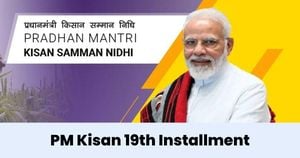The dust is beginning to settle on Germany's recent federal elections, where Friedrich Merz's conservative CDU/CSU secured victory, leading the country toward another phase of coalition talks.
Results show the CDU/CSU, bolstered by Merz's leadership, captured enough seats to emerge as the largest party; nevertheless, they fell short of the 316 required to govern outright. This has opened the door to tense negotiations as the CDU/CSU seeks new coalition partners. The most obvious choice is the Social Democrats (SPD), led by Olaf Scholz, who have previously governed alongside them.
Election day, February 24, 2025, witnessed substantial voter turnout against the backdrop of public discontent stemming from recent years. Merz petitioned for unity, stating, 'The German people have made a choice, and now they need to put together the government. I hope they do it as fast as possible,' as reported by Euro News.
The electoral process itself results from significant adjustments to Germany's parliamentary system intended to reduce the Bundestag from 736 to 630 seats. This reform has meant some winners, like CDU's Petra Nicolaisen, have expressed frustration, stating, 'I may have won the constituency, but what's the point? I lost in the end.'
Yet, the pathway to coalitional governance remains fraught with complexity. The CDU/CSU has ruled out collaboration with the far-right Alternative for Germany (AfD), which has, somewhat paradoxically, become the second-largest party following the election. Their strong performance, particularly across eastern Germany, has confirmed the party’s growing influence. Tino Chrupalla, AfD co-chair, celebrated the outcomes as evidence of regional discontent with traditional parties.
This electoral result sets up interesting dynamics between the major political players. The attempt to sideline the AfD is not without significant risks for the CDU/CSU, especially as Bavaria's CSU, led by Markus Söder, prepares to navigate the uneasy waters of increased competition from the AfD. He commented, 'We can feel the insecurity of the German people, we can hear them wondering: will they really do it?' highlighting the challenge facing conservatives as they seek to mitigate the AfD's appeal.
Friedrich Merz is expected to take Germany's reins, though it isn't yet clear how he might juggle diverging priorities among potential coalition partners. While the CDU/CSU aims toward cooperation with the SPD, past tensions complicate the prospect. Both parties now need to find common ground after their previous inclusive government left citizens disenchanted.
With international figures already congratulating him, including France's President Emmanuel Macron who pledged cooperation for 'a strong and sovereign Europe', the need for Merz to engage confidently with the international community has never been more urgent. Macron stated he looked forward to working together meaningfully, especially with regards to European security.
Globally, leaders took note of the elections. Former US President Donald Trump remarked, 'Much like the USA, the people of Germany got tired of the no common sense agenda,' echoing sentiments of change widely felt both domestically and internationally.
The EU's top diplomat, Kaja Kallas, articulated the pressing need for Germany to form its government quickly: 'We really need to move on with the decisions also on the European level,' she said, emphasizing the overarching need for stability within European governance.
While the CDU/CSU navigates coalition talks, one fact remains clear: they cannot ignore the significant rise of the AfD, which won almost every district across former East Germany. The incoming party's decisions will play a pivotal role for Germany and may prompt broader discussions on Europe’s political climate.
The next steps entail coalition negotiations, which could unravel quickly or be drawn out for weeks, even months, as witnessed during and after previous elections. For perspective, the 2017 elections recorded the longest negotiation period on record—six months. The speed of coming discussions will depend not only on party compatibility but also on the prevailing public sentiment and broader geopolitical happenings.
Through these layered developments, Germany faces pivotal decisions, and how Merz's coalition will position itself amid developing global alliances remains uncertain. All eyes will be on the new government as it strives to bring unity and change among the challenges it will undoubtedly face.



